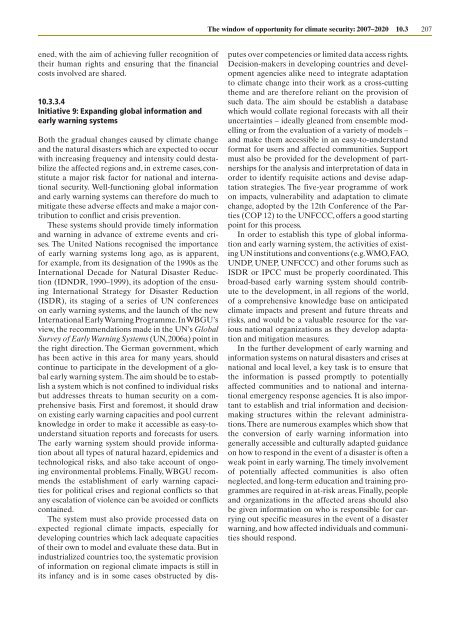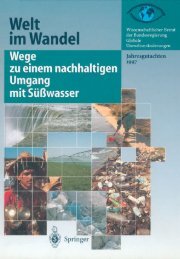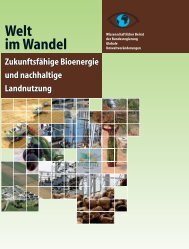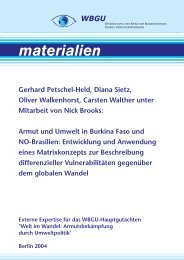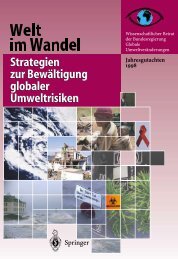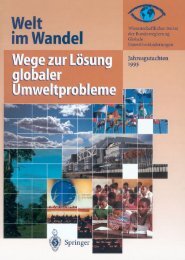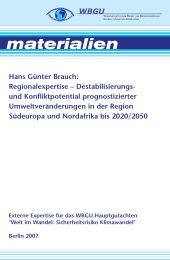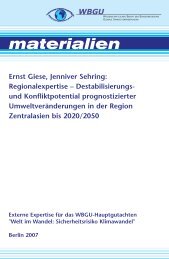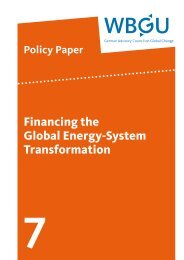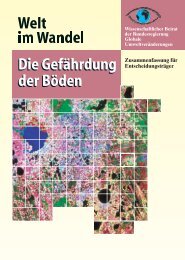World in Transition: Climate Change as a Security Risk - WBGU
World in Transition: Climate Change as a Security Risk - WBGU
World in Transition: Climate Change as a Security Risk - WBGU
Create successful ePaper yourself
Turn your PDF publications into a flip-book with our unique Google optimized e-Paper software.
ened, with the aim of achiev<strong>in</strong>g fuller recognition of<br />
their human rights and ensur<strong>in</strong>g that the f<strong>in</strong>ancial<br />
costs <strong>in</strong>volved are shared.<br />
10.3.3.4<br />
Initiative 9: Expand<strong>in</strong>g global <strong>in</strong>formation and<br />
early warn<strong>in</strong>g systems<br />
Both the gradual changes caused by climate change<br />
and the natural dis<strong>as</strong>ters which are expected to occur<br />
with <strong>in</strong>cre<strong>as</strong><strong>in</strong>g frequency and <strong>in</strong>tensity could destabilize<br />
the affected regions and, <strong>in</strong> extreme c<strong>as</strong>es, constitute<br />
a major risk factor for national and <strong>in</strong>ternational<br />
security. Well-function<strong>in</strong>g global <strong>in</strong>formation<br />
and early warn<strong>in</strong>g systems can therefore do much to<br />
mitigate these adverse effects and make a major contribution<br />
to conflict and crisis prevention.<br />
These systems should provide timely <strong>in</strong>formation<br />
and warn<strong>in</strong>g <strong>in</strong> advance of extreme events and crises.<br />
The United Nations recognised the importance<br />
of early warn<strong>in</strong>g systems long ago, <strong>as</strong> is apparent,<br />
for example, from its designation of the 1990s <strong>as</strong> the<br />
International Decade for Natural Dis<strong>as</strong>ter Reduction<br />
(IDNDR, 1990–1999), its adoption of the ensu<strong>in</strong>g<br />
International Strategy for Dis<strong>as</strong>ter Reduction<br />
(ISDR), its stag<strong>in</strong>g of a series of UN conferences<br />
on early warn<strong>in</strong>g systems, and the launch of the new<br />
International Early Warn<strong>in</strong>g Programme. In <strong>WBGU</strong>’s<br />
view, the recommendations made <strong>in</strong> the UN’s Global<br />
Survey of Early Warn<strong>in</strong>g Systems (UN, 2006a) po<strong>in</strong>t <strong>in</strong><br />
the right direction. The German government, which<br />
h<strong>as</strong> been active <strong>in</strong> this area for many years, should<br />
cont<strong>in</strong>ue to participate <strong>in</strong> the development of a global<br />
early warn<strong>in</strong>g system. The aim should be to establish<br />
a system which is not conf<strong>in</strong>ed to <strong>in</strong>dividual risks<br />
but addresses threats to human security on a comprehensive<br />
b<strong>as</strong>is. First and foremost, it should draw<br />
on exist<strong>in</strong>g early warn<strong>in</strong>g capacities and pool current<br />
knowledge <strong>in</strong> order to make it accessible <strong>as</strong> e<strong>as</strong>y-tounderstand<br />
situation reports and forec<strong>as</strong>ts for users.<br />
The early warn<strong>in</strong>g system should provide <strong>in</strong>formation<br />
about all types of natural hazard, epidemics and<br />
technological risks, and also take account of ongo<strong>in</strong>g<br />
environmental problems. F<strong>in</strong>ally, <strong>WBGU</strong> recommends<br />
the establishment of early warn<strong>in</strong>g capacities<br />
for political crises and regional conflicts so that<br />
any escalation of violence can be avoided or conflicts<br />
conta<strong>in</strong>ed.<br />
The system must also provide processed data on<br />
expected regional climate impacts, especially for<br />
develop<strong>in</strong>g countries which lack adequate capacities<br />
of their own to model and evaluate these data. But <strong>in</strong><br />
<strong>in</strong>dustrialized countries too, the systematic provision<br />
of <strong>in</strong>formation on regional climate impacts is still <strong>in</strong><br />
its <strong>in</strong>fancy and is <strong>in</strong> some c<strong>as</strong>es obstructed by dis-<br />
The w<strong>in</strong>dow of opportunity for climate security: 2007–2020 10.3<br />
putes over competencies or limited data access rights.<br />
Decision-makers <strong>in</strong> develop<strong>in</strong>g countries and development<br />
agencies alike need to <strong>in</strong>tegrate adaptation<br />
to climate change <strong>in</strong>to their work <strong>as</strong> a cross-cutt<strong>in</strong>g<br />
theme and are therefore reliant on the provision of<br />
such data. The aim should be establish a datab<strong>as</strong>e<br />
which would collate regional forec<strong>as</strong>ts with all their<br />
uncerta<strong>in</strong>ties – ideally gleaned from ensemble modell<strong>in</strong>g<br />
or from the evaluation of a variety of models –<br />
and make them accessible <strong>in</strong> an e<strong>as</strong>y-to-understand<br />
format for users and affected communities. Support<br />
must also be provided for the development of partnerships<br />
for the analysis and <strong>in</strong>terpretation of data <strong>in</strong><br />
order to identify requisite actions and devise adaptation<br />
strategies. The five-year programme of work<br />
on impacts, vulnerability and adaptation to climate<br />
change, adopted by the 12th Conference of the Parties<br />
(COP 12) to the UNFCCC, offers a good start<strong>in</strong>g<br />
po<strong>in</strong>t for this process.<br />
In order to establish this type of global <strong>in</strong>formation<br />
and early warn<strong>in</strong>g system, the activities of exist<strong>in</strong>g<br />
UN <strong>in</strong>stitutions and conventions (e.g. WMO, FAO,<br />
UNDP, UNEP, UNFCCC) and other forums such <strong>as</strong><br />
ISDR or IPCC must be properly coord<strong>in</strong>ated. This<br />
broad-b<strong>as</strong>ed early warn<strong>in</strong>g system should contribute<br />
to the development, <strong>in</strong> all regions of the world,<br />
of a comprehensive knowledge b<strong>as</strong>e on anticipated<br />
climate impacts and present and future threats and<br />
risks, and would be a valuable resource for the various<br />
national organizations <strong>as</strong> they develop adaptation<br />
and mitigation me<strong>as</strong>ures.<br />
In the further development of early warn<strong>in</strong>g and<br />
<strong>in</strong>formation systems on natural dis<strong>as</strong>ters and crises at<br />
national and local level, a key t<strong>as</strong>k is to ensure that<br />
the <strong>in</strong>formation is p<strong>as</strong>sed promptly to potentially<br />
affected communities and to national and <strong>in</strong>ternational<br />
emergency response agencies. It is also important<br />
to establish and trial <strong>in</strong>formation and decisionmak<strong>in</strong>g<br />
structures with<strong>in</strong> the relevant adm<strong>in</strong>istrations.<br />
There are numerous examples which show that<br />
the conversion of early warn<strong>in</strong>g <strong>in</strong>formation <strong>in</strong>to<br />
generally accessible and culturally adapted guidance<br />
on how to respond <strong>in</strong> the event of a dis<strong>as</strong>ter is often a<br />
weak po<strong>in</strong>t <strong>in</strong> early warn<strong>in</strong>g. The timely <strong>in</strong>volvement<br />
of potentially affected communities is also often<br />
neglected, and long-term education and tra<strong>in</strong><strong>in</strong>g programmes<br />
are required <strong>in</strong> at-risk are<strong>as</strong>. F<strong>in</strong>ally, people<br />
and organizations <strong>in</strong> the affected are<strong>as</strong> should also<br />
be given <strong>in</strong>formation on who is responsible for carry<strong>in</strong>g<br />
out specific me<strong>as</strong>ures <strong>in</strong> the event of a dis<strong>as</strong>ter<br />
warn<strong>in</strong>g, and how affected <strong>in</strong>dividuals and communities<br />
should respond.<br />
207


